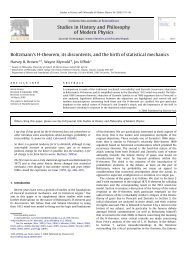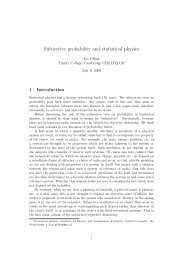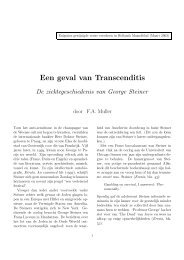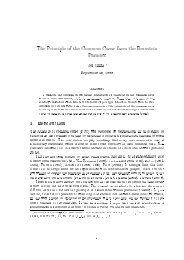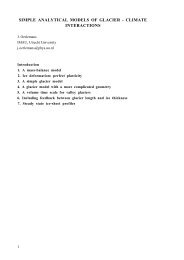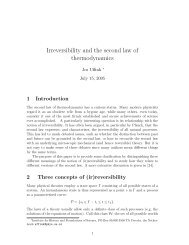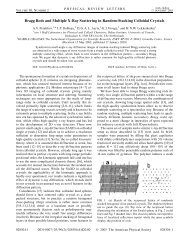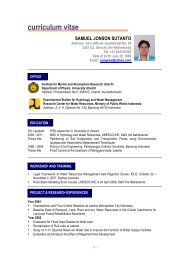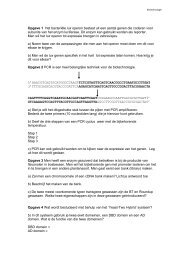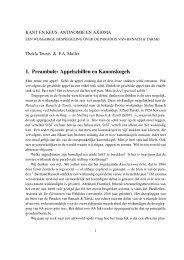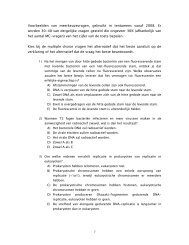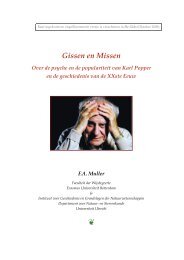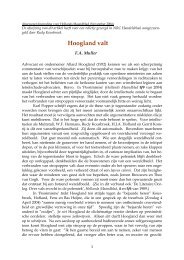FOUNDATIONS OF QUANTUM MECHANICS
FOUNDATIONS OF QUANTUM MECHANICS
FOUNDATIONS OF QUANTUM MECHANICS
You also want an ePaper? Increase the reach of your titles
YUMPU automatically turns print PDFs into web optimized ePapers that Google loves.
152 CHAPTER VII. BELL’S INEQUALITIES<br />
◃ Remark<br />
The derivation of (VII. 57) directly comes from expression (VII. 52) and as a result, the existence of<br />
hidden variables does not have to be presumed, only locality was required. Sensationally, we seem to<br />
have proved that quantum mechanics is empirically inconsistent with the requirement of locality. ▹<br />
The experimental violation of the Bell inequalities thus leads us to the conclusion that physical<br />
reality is not local. What we, however, have presupposed in the matching condition (VII. 51) is that<br />
we can simultaneously assign values to a n and a n′ , although they cannot be simultaneously measured<br />
because the spin measuring device cannot be at the same time in both positions ⃗a and ⃗a ′ ≠ ⃗a. In fact,<br />
of the set of four terms in (VII. 52), at the most one of them is experimentally realizable. Still, we<br />
spoke of outcomes of measurements that have not actually been carried out. Of course, the derivation<br />
of the Bell inequality (VII. 57) from the matching condition (VII. 51) is mathematically flawless. The<br />
question is whether the matching condition (VII. 51) follows from the requirement of locality. We<br />
will now explore this question further.<br />
VII. 4. 1<br />
COUNTERFACTUAL CONDITIONAL STATEMENTS AND INDETERMINISM<br />
Let a n be the outcome of experiment I. With their matching condition, Eberhard and Stapp claim<br />
that this value of a n would be unaltered if we had carried out experiment II instead of experiment I<br />
because these experiments only differ in the settings of the B - meter, which is far away. Therefore,<br />
a n is the outcome which the spin meter A would have given for the n th pair of particles for both<br />
experiment I and experiment II. Redhead (1987, p. 92) formulates this requirement as follows<br />
PRINCIPLE <strong>OF</strong> LOCAL COUNTERFACTUAL DEFINITENESS (PLCD):<br />
The result of an experiment which could be performed on a microscopic system has a<br />
definite value which does not depend on the setting of a remote piece of apparatus.<br />
This means that if this setting would have been different, the outcome of the experiment would<br />
not have been different. Using the same mathematics as before it follows that<br />
PLCD → Bell inequality. (VII. 58)<br />
Since PLCD is an assumption of locality concerning outcomes of measurements, (VII. 58) seems<br />
to be independent of the existence of hidden variables. But appearances are deceptive. In fact, PLCD<br />
is only reasonable in a deterministic context, and not in the case of indeterminism.<br />
Consider the following example given by Redhead (ibid.). Suppose that, at t 1 , just before the<br />
clock strikes twelve, I raise my hand. Now I ask the question if the clock would also have struck if<br />
I had not raised my hand at t 1 . Intuitively, the right answer is ‘Yes’, in agreement with PLCD. Now<br />
replace the clock by a radioactive atom which decays at t 2 . Suppose I raised my hand at t 1 < t 2 ,<br />
would the atom also have decayed if I had not done this? Now the answer is far from clear. If the<br />
decay is purely indeterministic, a recurrence of the experiment, even if it is just a thought experiment,<br />
does not have to have the same outcome. The supposition that the atom would not have decayed if I<br />
had not raised my hand, is not contradictory to locality.<br />
The assumptions that outcomes of measurements remain to have the same values even if they are<br />
not measured, or that measurements which are not carried out have certain outcomes in advance, are



